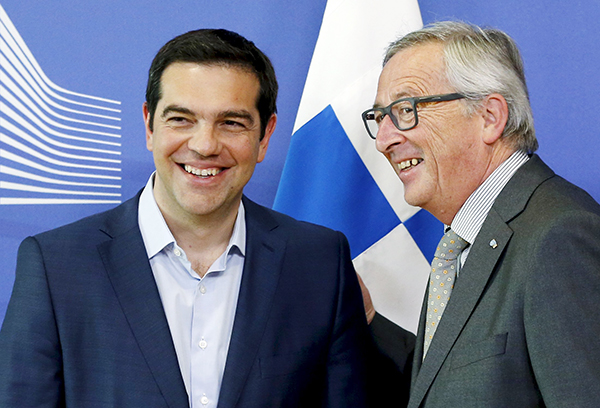 |
|
Greek Prime Minister Alexis Tsipras (L) is welcomed by European Commission President Jean-Claude Juncker ahead of a meeting at the EU Commission headquarters in Brussels, Belgium, June 3, 2015. Greece's international creditors signalled on Wednesday they were ready to compromise to avert a default even as Athens warned it might skip an IMF loan repayment due this week. [Photo/Agencies] |
BRUSSELS - Greece's prime minister Alexis Tsipras said early Thursday he found a constructive approach during a showdown with creditors in Brussels and all sides insisted talks to unlock crucial bailout loans and save the country from financial disaster would continue within days.
Even though Greece is running out of cash and faces more debt repayments as soon as Friday, Tsipras still found a lifeline to keep the momentum for more negotiations going.
"I believe that, in any case, agreement is in sight but we need to conclude the discussions with a realistic point of view," Tsipras said.
French President Francois Hollande said ahead of the Brussels talks that end around midnight Wednesday that the negotiations were at least heading in the right direction: "We are some days, not to say some hours away from a possible agreement."
Greece has been negotiating for four months with its creditors over what budget reforms it should make to get the 7.2 billion euros ($8.1 billion) in loans that are left over in its bailout fund. Wednesday's meetings are part of a string of high-level diplomatic efforts to bring the negotiations to a successful end.
Asked whether he would be able to make the next repayment to the International Monetary Fund next Friday, Tsipras said: "Don't worry about it."
After his dinner with EU Commission chief Jean-Claude Juncker, Tsipras stressed the positive.
The Commission showed a constructive intention to reach common ground," he said. "Discussions will continue in coming days."
At the same time, Tsipras maintained he would continue to defend the poor and needy in the face of calls for more austerity reforms to unlock bailout funds.
Tsipras said "proposals such as cutting supplementary payments to people with very low pensions, or increasing VAT on power bills by ten percentage points are proposals that, naturally, lack any basis for us to discuss them."
Tsipras also spoke by teleconference with Hollande and German Chancellor Angela Merkel ahead of his meeting with Juncker, a Greek government official said.
The three agreed on the need for Greece to have lower primary surpluses - the budget balance without taking into account debt servicing.
"We are very close in an agreement in the primary surpluses, that means that all the sides agreed to go further without the tough austerity measures of the past," Tsipras said.
Lower primary surpluses than those initially demanded under Greece's five-year bailout have been one of Athens' main requests, although it appears to have been the easiest to overcome in the negotiations.
Sticking points appear to have been labor and pension reforms, as well as some changes to consumer tax.
The eurozone's top financial official, Jeroen Dijsselbloem, was also in Brussels and met with Juncker and Tsipras. He was less upbeat than others going into the meeting, saying: "We still have a lot of work to do." But he also came out saying the talks would continue within days.
Greek markets were rising on hopes of a deal, with the main stock index closing up 4.1 percent.
Time is pressing. Greece must repay 1.6 billion euros to the IMF this month alone. The first installment of just over 300 million euros is due Friday, with other installments on June 12, 16 and 19. Although Athens insists it intends to repay its debts, it is unclear how much longer it will be able to do so without outside help.
One option Greece could choose is to bundle this month's IMF payments into one on June 30, giving more time for negotiations. While allowed under IMF regulations, the option is rarely used.
Without bailout funds, Greece could eventually default on its debts and crash out of the euro, possibly pushing Europe and potentially the global economy into turmoil.
"We are working with high pressure" to find a solution, Merkel said in Berlin.
Tsipras says he submitted his proposal to creditors on Monday night but gave no details of what fiscal reforms Greece was suggesting in return for its final bailout funds.
Greece needs the loans because it is locked out of the international bond markets as wary investors demand prohibitively high interest rates to lend it money. The country has not received bailout funds since August.
So far it has managed to scrape together enough to repay its debts by seizing the reserves of state enterprises, including municipalities, schools, embassies and hospitals. But those funds will not be enough to sustain the country through the summer.
Elected in January on promises to repeal the deeply resented austerity measures Greece had to impose in return for its five-year bailout, Tsipras said his government had made concessions during the negotiations.
The 40-year-old premier faces dissent from hardliners from within his own radical left Syriza party, some of whom openly say they prefer a rupture in negotiations and even a euro exit, to capitulation on pre-election promises.
One of the most vocal critics of compromise has been Energy Minister Panagiotis Lafazanis.
"The logic of a deal at any cost ... is a logic of the country's total surrender to the worst neocolonial regime," Lafazanis was quoted as telling the news website Real.gr Wednesday.
"A deal will either be compatible with Syriza's progressive program, or it will not exist."